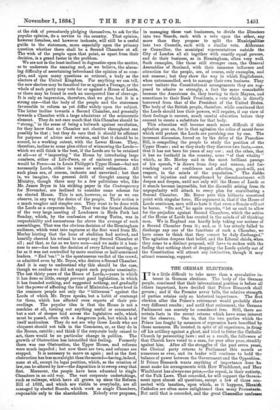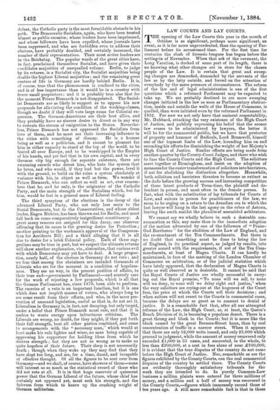THE GERMAN ELECTIONS.
IT is a little difficult to take more than a speculative in- terest in German elections. The body of the German people, convinced that their international position is before all others important, have decided that Prince Bismarck shall govern ; and if the Premier never falls, the relative strength of parties retains only an historical importance. The first election after the Prince's retirement would probably show very different results ; and until that retirement, the German Parliament can scarcely be considered free. Still, there are certain facts in the recent returns which have some interest for the observer. One is, that the two parties which the Prince has fought by measures of repression have benefited 'by those measures. He insisted, in spite of all experience, in firing off his artillery against a ghost, and tried to fetter the Catholic Church by persecuting laws ; and as a result, the followers of that Church have voted to a man, for year after year, steadily against him. After all the struggles of the past seven years, the Clerical party returns to Parliament this month as numerous as ever, and its leader will continue to hold the balance of power between the Government and the Opposition. If Prince Bismarck wants anything of importance done he must make his arrangements with Herr Windthorst, and Herr Windthorst has always one price,—the repeal, in their entirety, of the Falk Laws. That conceded, he will support the Govern- ment upon almost all questions, except a few of those con- nected with taxation, upon which, as it happens, Rhenish Catholics are often more enlightened than many Protestants. But until that is conceded, and the great Chancellor confesses defeat, the Catholic party is the most formidable obstacle in his path. The Democratic Socialists, again, who have been treated almost as public enemies; whose leaders have been imprisoned, and whose followers have been expelled, whose journals have been suppressed, and who are forbidden even to address their electors, have probably doubled, and certainly increased, the number of their representatives. Their most active leaders are in the Reichstag. The popular wards of the great cities have, in fact, proclaimed themselves Socialist, and have given their candidates majorities of unequalled volume. Berlin, to judge by its returns, is a Socialist city, the Socialist majorities being double the highest Liberal majorities ; and the remaining great centres of life in Germany are hardly behind Berlin. It is, of course, true that the phenomenon is confined to the cities, and is of less importance than it would be in a country with fewer small proprietors ; and it is probably true also that for the moment Prince Bismarck is not disappointed. The Social- ist Democrats are as likely to support as to oppose his new proposals for alleviating the condition of the working-classes, though we doubt if they will vote large sums for Colonial ex- pansion. The German-Americans are their best allies, and they probably have no sincere desire to divert or in any way to restrain the stream of emigration to the States. Neverthe- less, Prince Bismarck has not oppressed the Socialists from love of them, and he must see their increasing influence in the cities with something of dismay. He is a human being as well as a politician, and it cannot be pleasant for him in either capacity to stand at the top of the world, to be feared all over Europe, and to be worshipped in the Empire of his hands, and yet feel that in his own capital, and in every German city big enough for separate existence, there are swarming crowds who detest him, who hate the system that he loves, and who would, if they had but the power, level it with the ground, to build on the ruins a system absolutely at variance with his, in object as well as form. We wonder if Prince Bismarck, who can reflect as well as act, ever remem- bers that he, and he only, is the originator of the Catholic Party, and the main strength of the Socialism which, but for him, would be lost in a general mass of Liberal feeling.
The third symptom of the elections is the decay of the advanced Liberal Party, who not only lose seats to the Social Democrats, but to the Conservatives, and whose ablest leader, Eugen Richter, has been thrown out for Berlin, and must fall back on some comparatively insignificant constituency. A great many reasons are assigned for this decay, one observer affirming that its cause is the growing desire for Protection ; another pointing to the workmen's approval of the Compensa- tion for Accidents Bill ; and a third alleging that it is all due to desire for a brisk Colonial policy. Each of these sug- gestions may be true in part, but we suspect the ultimate returns will show another explanation, viz., abstention, that curious evil with which Democracy may yet have to deal. A large propor- tion, nearly half, of the electors in Germany do not vote ; and we fear that among the abstainers are included thousands of Liberals who are for the moment in a condition of hopeless- ness. They see no way, in the present position of affairs, to their true end—government by Parliament—and scarcely care for the work of rejecting a few proposals, which is all that the German Parliament has, since 1870, been able to perform. The exercise of a veto is an important function, but it is one which does not inspirit masses of voters, who always long to see some result from their efforts, and who, in the mere pre- vention of unsound legislation, useful as that is, do not see it. Liberalism in Germany is, in fact, not decaying, but only torpid, under a belief that Prince Bismarck must rule, and that it is useless to waste energy upon infructuous criticism. The Liberals are wrong, no doubt, for they might, if they put forth their full strength, beat all other parties combined, and come to arrangements with the " necessary man," which would at least make his rule lighter and wiser, no man being capable of oppressing his supporters for holding ideas from which he derives strength ; but they are not so wrong as to make us quite hopeless of their future. Their sleep is not necessarily death ; though when they wake up they may find that they have slept too long, and are, for a time, dazed, and incapable of effective thought. Of all the figures to be sent over from Germany—and we shall, of course, have showers of them—none will interest us so much as the statistical record of those who did not vote at all. It is in that huge reservoir of quiescent power that the German Liberal of the future, whose chief has certainly not appeared yet, must seek his strength, and the fulcrum from which to heave up the crushing weight of German militarism.















































 Previous page
Previous page